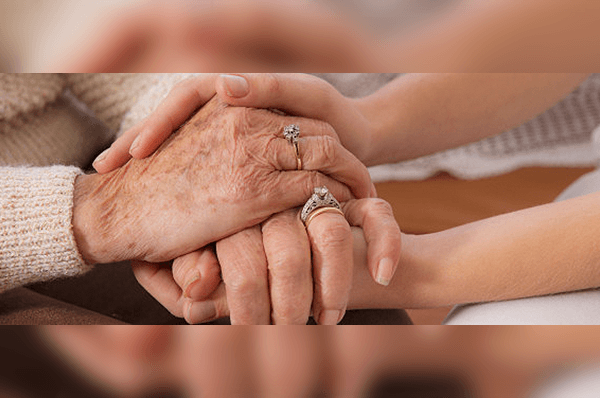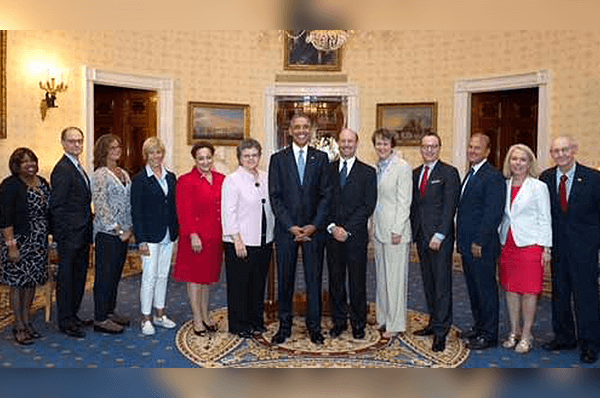August 3, 2015 — WASHINGTON, D.C. — The White House held its sixth Conference on Aging, earlier this month, and this once-a-decade program took an entirely different approach to the discussion of what it means to age in America. Since the first conference in 1961, the United States has changed in dramatic ways, and this year’s conference challenged participants to think more broadly about aging, to reimagine today’s longer lives in ways that better represent the experiences and needs of Americans.

Photo: President Obama photographed with a group of White Conference on Aging dignitaries.
Article author Dr. Bruce Chernof is on the president’s right.
WASHINGTON, D.C. — The White House held its sixth Conference on Aging, earlier this month, and this once-a-decade program took an entirely different approach to the discussion of what it means to age in America.
Since the first conference in 1961, the United States has changed in dramatic ways, and this year’s conference challenged participants to think more broadly about aging, to reimagine today’s longer lives in ways that better represent the experiences and needs of Americans.
Three Successes
For me, this year’s conference succeeded in three important ways.
First, President Obama attended and spoke forcefully on the issues at hand, acknowledging America as an aging and vibrant nation.
His remarks are critical given that aging as a personal, family, community and societal issue gets scant attention compared to other domestic matters. Bringing the presidential bully pulpit to bear on broader questions of how we wish to age; what we want the support system to look like; and how one’s dignity, respect and choice should be honored when having needs — as most of us will — is the White House’s appropriate and vital role.
Second, the conference theme provided leadership on setting a vision to transform how Americans can talk respectably about vulnerable aging and the need for daily supports.
Speakers broke from well-worn, unproductive narratives of aging (aging = being sick, poor, and alone; caregiving = burden; aging policy = safety net programs). These themes have tended to frame issues of vulnerable aging as someone else’s problem — not concerns in which all American have a stake — therefore excluding them from serious public discourse.
Instead, the conference reshaped what it means to age with needs in creative ways. How can we learn from the sharing economy to support the needs of older adults living in the community and their caregivers? How can the banking industry play a role in identifying older customers’ early cognitive impairment and protect them against elder abuse by spotting suspicious activity in their accounts?
How can technology enable safer, more connected environments so older adults can live as they choose? These discussions are relevant for all economic strata.
Third, the conference moved beyond Washington, D.C.’s insider debates among policy aficionados by engaging local communities from grassroots to grass-tops champions. Conference leaders and cabinet secretaries facilitated listening sessions across the country, starting in Sacramento last September at The SCAN Foundation’s Long-Term Services and Supports Summit and continuing throughout 2015.
Conference staff developed four public policy briefing papers [http://tinyurl.com/qdce69a] to inform those tuning into the day’s program around the country in order to spark public comment onsite and online. Live streaming and an active social media presence connected 700 community watch parties to the conference, with the hashtag #WHCOA reaching #3 on Twitter’s trending list that day.
What Was Missing?
So what was missing? With all the talk about building retirement security, there was no mention of the largest and most unpredictable factor that erodes it: the cost of long-term care (LTC).
A federal report released after the conference shows that half of Americans who reach age 65 will have severe functional needs in their life with an average cost of $138,000 overall. Families have few tools to plan for this economic shock due to the broken LTC insurance market. This is a profoundly important issue for racial and ethnic communities.
As the country ages, older adults will be more diverse, have fewer resources and likely fewer children in their families available to provide the necessary care.
We need to build a set of forward-looking solutions that account for these realities. This includes strengthening and modernizing both Medicare and Medicaid — programs now being celebrated for their 50th anniversaries — to better meet the needs of vulnerable people to live successfully in the communities of their choice.
It also means seeing LTC needs as part of a larger picture of well-being as we age, which requires new thinking about economic security.
The White House conference made a point to highlight the role that the private sector might play in bringing new innovation to aging services. This is a very important question for ethnic and racial communities.
Technology can be an incredibly effective tool in overcoming language barriers and increasing connectivity, but it needs to be planned for and built intentionally.
Furthermore, we need to move beyond a usual “digital divide” discussion and start thinking about the next wave of technology in our lives — the internet of things.
In the next decade, almost every home appliance or device will be able to connect and communicate through the Internet. Pillboxes will know someone is out of medications and automatically order them. Refrigerators will know if the milk has expired or if its door hasn’t opened in the last 24 hours, possibly prompting a call to see if a senior is all right.
The examples are myriad. The question is will everyone have access to this kind of technologic support in their homes?
Furthering the Dialogue
Beyond the conference, the administration should further the dialogue on aging across people and systems.
Although direction and resources originate from federal efforts, services are delivered locally with much that states and localities can do to better the lives of older adults and families. The private sector’s key role continues to be creating innovation for wider adoption; this must include ethnic and immigrant communities.
America is changing through population aging. We are reshaping family, work, retirement and societal engagement, which will fundamentally alter the landscape starting with Boomers and then Gen Xers, Millennials–and those beyond.
We will be a far more diverse country over the next few decades and America is just beginning to embrace this new reality. It is time that social and economic structures evolve to better meet the needs of vulnerable elders in every community.
Read the article here:
http://newamericamedia.org/2015/08/white-house-aging-conference-new-directions–big-challenges.php











